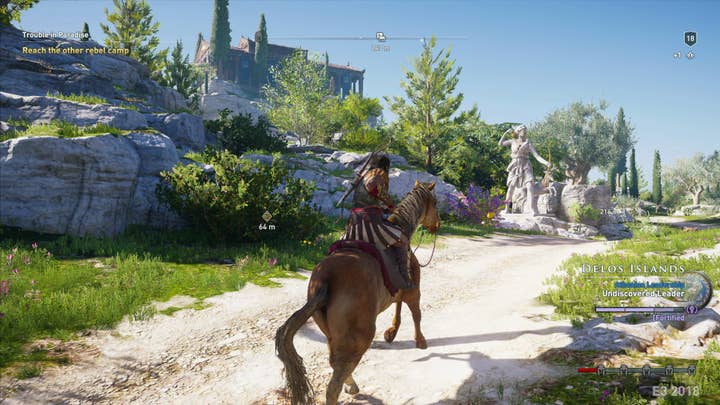Even Assassin's Creed is a live service now
Ubisoft's push for longer engagement continues in Odyssey, says Ubisoft's Alain Corre, with plans for weekly content updates
It's no secret that Ubisoft is among the publishers pushing for a service-driven business.
Casually stroll past its E3 booth, or even just watch its press conference, and you can see the firm giving a lot of love to games that have been out for over a year - most notably For Honor and Rainbow Six: Siege. Even titles like Skull & Bones and Tom Clancy's The Division 2 have openly been designed to engage players for years, not weeks.
Yet GamesIndustry.biz was still a little surprised when EMEA executive director Alain Corre told us Assassin's Creed, the publisher's flagship franchise, is now part of that strategy. In fact, we asked him to repeat and clarify just to be sure we'd heard correctly.
"Yes, it's a service," he said. "It's a service-type product.
"The idea with Odyssey is to create new content every week so that it's a [lively] adventure for the fans. So there's always something new, something fresh and something they can discover and appreciate. We want this Odyssey to be living, to always be fresh, so it's a different way to create games this way."

When pressed for further details on what type of content would be released on a weekly basis, Corre was unable to give any further information. However, he said that post-launch content is, "planned for a long time."
It's likely these weekly updates will be relatively simple: a new challenge here ('kill ten mercenaries without being defeated'), a new costume there ('now you can dress up as Bayek'), perhaps with the occasional larger drop of new quests. Like Origins before it, Odyssey has been designed with a huge world, so there is plenty of scope for Ubisoft to give players a reason to check in every week as it intends.
It's an interesting direction for the series, one in line not only with Ubisoft's portfolio, but the series in general. Assassin's Creed has been gradually evolving from the 15-hour action games it started with, through the open-world antics of Black Flag, to the vast, RPG-like experience of Origins - a title Corre told us racked up more hours played per user than any other entry in the series. It also speaks to the ongoing trend of longer-tail games across the industry. So was it inevitable that even Assassin's Creed would reach the stage where it needs to be updated on a weekly basis?
"The idea is to create new content every week so that it's a [lively] adventure for the fans. We want this Odyssey to be living, to always be fresh"
"When you look around, more and more it's games-as-a-service [titles] that are the most appreciated by the fans," Corre said. "Because when you have invested tens and tens of hours in a game, and if there are new reasons to stay because you have fresh content to come, or innovation on a regular basis, then you are happy because all of the time you have invested... It's part of your life."
The immediate alarm bell that will ring when Ubisoft better communicates that Assassin's Creed Odyssey is a live service concerns monetisation. After last year's backlash against loot boxes - which publishers have clearly learned from, judging by E3 2018 so far - consumers might be cautious about anything designed to be sustained over a longer period of time.
No matter how simple Odyssey's weekly updates are, that ongoing development will need to be funded. Fortunately, Ubisoft has previously shown itself to be responsible with how it handles monetisation in Assassin's Creed. Origins' in-game shop sold everything from virtual currency to legendary weapons and was entirely optional, largely escaping the wrath aimed at AAA titles towards the end of 2017.

While there are no details about how Odyssey will be monetised, Corre assures us that the publisher will continue to be careful.
"What is important for us is the happiness and the pleasure of our fans," he says. "We have always said we would create extra content they would be happy to pay for if it was something that was logical. When we create costumes or cosmetic items, you can choose whether to buy them or not. It depends on what you wish. It doesn't change the balance of the game at all, which we have always been very careful about.
"Some players don't have the same time as others, so we have boosters, but this is really the only thing we're doing because we want the pleasure of our fans. That's really key in the long run, because we're in the creation of franchises and worlds in the long run, and we want to respect the fans because we want them to go on supporting us."
This is not to say Odyssey will be the last Assassin's Creed, perennially refreshed by those weekly updates. Given the success of Origins and the hype for this year's Grecian outing, Ubisoft would be foolish not to continue building on its biggest franchise. Yet given the firm's increasing focus on servicing its titles far beyond launch, could we see a future Ubisoft no longer announcing sequels at E3, just new expansions and updates?
"I think it depends on the games," says Corre. "On some products it makes more sense to have continuity and to improve it through the years, to bring so much innovation that people feel like it's a new game every time they play it.
"For some other games we will have different options, so we don't know exactly which franchises will be like that - we haven't decided yet. But yes, there will be some franchises with proper sequels and some that will go on and grow over the years because we're bringing enough innovation on an ongoing basis."
